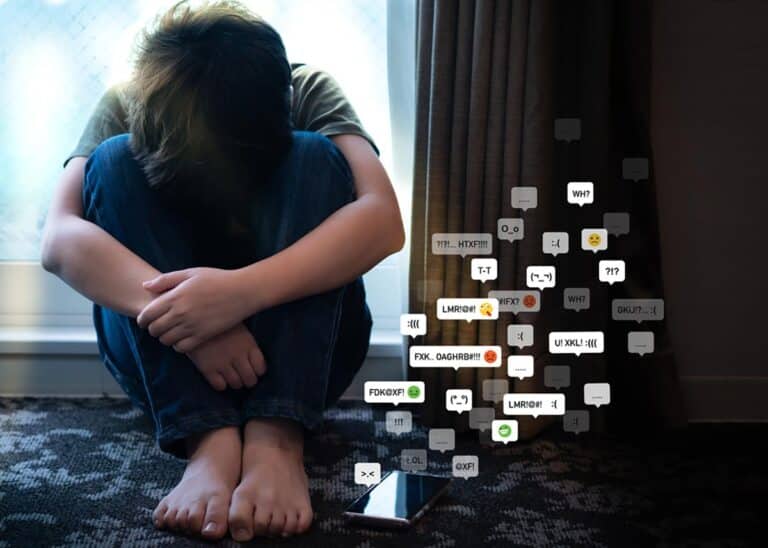
Editor’s note: The names of students interviewed in this article have been changed to protect their privacy. Please note that these interviews were conducted before Oct. 7.
Online antisemitism is far from new. From insinuations of global Jewish dominance to George Soros conspiracy theories, Holocaust denial, and irrelevant “Free Palestine” comments under unrelated videos, the hate is pervasive and has only increased since Oct. 7.
Yet, the impact of this hate on Jewish Gen Z, who spend significant portions of their lives on social media, remains less explored. With recent increases in antisemitism both in-person and online, understanding how this hate is impacting young Jews and what we can do to address it is crucial.
To delve into the impact of online antisemitism and how to best address it, I spoke with Rabbi Steven Leder of Wilshire Boulevard Temple in Los Angeles, as well as several Gen Z students, to get their perspectives and insights. Their experiences shed light on the challenges they face and possible ways forward. Here’s what they told me.
Read more: Self-care tips when the news gets too overwhelming
The prevalence of online antisemitism
Even prior to Oct. 7, there was a concerning growth of antisemitism online. An analysis by the Institute for Strategic Dialogue showed that following Elon Musk’s takeover of X (then Twitter), antisemitism more than doubled on the platform for over four months. Additionally, the use of the word “Jew” increased by 500% within Musk’s first week.
Meanwhile, TikTok has been heavily criticized for failing to combat the spread of antisemitism, hate speech, and misinformation. Antisemitism on the platform has only increased following Oct. 7.
Instagram and Facebook aren’t free of antisemitic hate either. Diagrams showing alleged Jewish domination over governments, antisemitic conspiracy theories, and Holocaust trivialization are common across both platforms.
“The classic tropes, the classic stereotypes of Jews…Every comment section [on Jewish or Israeli content] is just filled with antisemitic rhetoric and stereotypes,” Noah, a high school senior, recalled.
“It’s all too frequent,” Jonah, another high school senior, agreed.
Yael, a Gen Z Israeli, encountered similar antisemitism through video games. When players would find out she was Jewish, “they would start yelling ‘free Palestine,’ they started to curse me…they started to tell me I should go to hell…Nothing too special.”
We used to talk about antisemitism as mostly being on the fringes of the internet, but it has become much more mainstream.
“The story is an old story,” Rabbi Leder said. “The way it’s being told and distributed is new, and dangerous, and permanent.”
“I can’t think of another period in Jewish history when millions of people can instantly be exposed to Jew-hatred and antisemitic tropes,” he added.
How does online antisemitism affect young Jews?
The conversations revealed a disturbing impact on Gen Z’s mental health. “It is scary at the end of the day, and it does make me mad that there are people who hate me because of my religion or hate me because of my ethnicity,” Noah said.
Ella, a high schooler in Los Angeles, shared that antisemitism “makes me feel terrible. I would say I feel really overwhelmed and emotional around it.” She also described that “even though I wasn’t seeing [antisemitism] in real life, it felt like social media was a representation of that.”

Others said they actively change how they present themselves online to avoid hate. “I try not to advertise that I’m Jewish,” Jonah stated, adding that he doesn’t post when he is at a bar or bat mitzvah or other Jewish events. “I don’t want any hate.”
Yael agreed, noting that she’ll only talk about her Jewish identity online when her name isn’t connected to it. “I have, several times, changed my name [online] because I have a very, very unique name. It’s very Jewish, very Israeli…I just try to conceal my Jewish identity.”
Refraining from posting about Jewish topics online has become common among Jewish creators. Several Jewish TikTok creators interviewed by NBC News said that they are often bombarded with antisemitic comments when they publicly present their Jewish identities.
How do young Jews respond to antisemitism they encounter online?
Noah said that he used to comment on antisemitic posts to refute them, but no longer does. “Nowadays, there’s so much of it…I report antisemitic posts that I see online, but Instagram does not take them down.”
Yael agreed. “I started to fight it…then I realized it has no cure and fighting is not something I can do forever,” she said. “I used to get hurt at the start, but at this point, it’s just another part of the day.”
Despite the continued vitriol, most of the Jews interviewed said they do not take social media breaks.
“I definitely don’t take a break,” Noah said. “Maybe at times it would be beneficial to, but I don’t. I kind of just try to move forward.”
Others attempt to dismiss the antisemitism online: “What are these people doing with their time? How do they have nothing going on that this is their best alternative?” Jonah said. “I don’t let it get to me.”
Yael agreed that pausing and remembering who you’re interacting with online is helpful: “They’re just trolls on the internet. They don’t know who I am and probably don’t know a lot about Judaism and about Israel…I just try to ignore it.”
Some public creators have decided to address antisemitism head-on. Unpacked’s Yirmiyahu Danzig, for example, uses his platform to create content debunking antisemitic tropes and to share on-the-street interviews with Jewish and Arab Israelis, Palestinians, Druze, and others.
Standing up against online hate
Reporting hateful content online is sometimes useful, but it often fails to prompt action. Much of large platforms’ content moderation is done by AI, which can overlook dog whistles and other subtle forms of hate speech. Although it’s not solely the responsibility of users, reporting offensive posts can help combat online hate.
In addressing the negative effects of online antisemitism on Gen Z, Rabbi Leder said that we have two options: We can either ignore the antisemitism and allow it to grow, or we can counteract the hate.
“The best antidote to Jew-hatred is well-educated, proud Jews,” he said. “Be loud and proud, and allow it to galvanize us and unify us…We have agency. What we do and say matters. We either live that way, or we don’t.”
To educate yourself, check out Unpacked’s guide to understanding antisemitism and resources on the war, including videos, podcasts, and articles about the history and current state of the conflict.
And remember, there are many ways to take care of yourself despite the distress online hate causes. Taking regular social media breaks can provide a helpful pause from online hostility. Participating in events through your synagogue, Hillel, youth group, or other Jewish organizations can provide a safe space to share your thoughts.
“I’ve started going to temple with my grandma,” Ella said. “Being surrounded by people who share the same identity as you can negate or contradict the things you see on social media…I came out of synagogue feeling a lot more loved…I felt a lot more supported.”
“I do think [antisemitism] will only make me stronger,” Yael said. “It will only make me believe in Judaism even more because even though I get hate, I still get love from my family, and I see how the Jewish community…deals with that antisemitism. [It] just makes me feel even more proud of being a Jew and being a part of this great community.”
Read more: How to deal with antisemitism as a college student
Originally Published Dec 31, 2023 12:08PM EST


